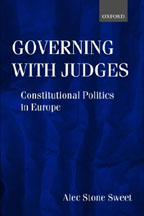
Governing with Judges:
Constitutional Politics in Europe
Alec Stone Sweet

Oxford University Press
2000
Hardback and Paper
From the Dustcover:
In Governing with Judges, Alec Stone Sweet elaborates a theory of constitutional politics, the process through which the discursive practices and techniques of constitutional adjudication come to structure the work of governments, parliaments, judges, and administrators. Focusing on the cases of France, Germany, Italy, Spain, and the European Union, the book examines the sources and consequences of the pan-European movement to confer constitutional review authority on a new governmental institution, the constitutional court. Detailed case studies illustrate how and to what extent legislative processes have been placed under the influence of constitutional judges. In a growing number of policy domains, these judges function as powerful, adjunct legislators. As constitutional courts have consolidated their position as authoritative interpreters of the constitutional law, and especially of human rights provisions, the work of the judiciary, too, has gradually been constitutionalised. Today, ordinary judges seek to detect violations of the constitution in their application of the various codes, and to rewrite statutes that they deem unconstitutional. Constitutional politics have not only provoked the demise of traditional notions of parliamentary sovereignty, they have organized profound transformations in the very nature of European governance.
Stone Sweet argues that constitutional adjudication constructs complex causal linkages between rule systems and normativity, on the one hand, and the strategic behavior of individuals, on the other. The theory thus constitutes a novel synthesis of normative and rational approaches to politics. The book also addresses central questions raised by a wide range of ongoing theory projects, including the "new institutionalism," rational choice, principal-agent theories of delegation, and the new constitutionalism in Continental legal theory.
Written primarily for a scholarly audience with little prior knowledge of constitutional law and politics, Governing with Judges would be appropriate for use in law schools, and in advanced undergraduate and graduate courses in comparative politics, comparative law, European Government, and the New Institutionalism.
Table of Contents
Chapter 1: Norms, Dispute Resolution, Judicialization
Chapter 2: Constitutional Adjudication and Parliamentary Democracy
Chapter 3: Legislating
Chapter 4: Protecting Rights
Chapter 5: The Politics of Judging
Chapter 6: Constructing a Supranational Constitution
Chapter 7: Theory of Constitutional Politics
References